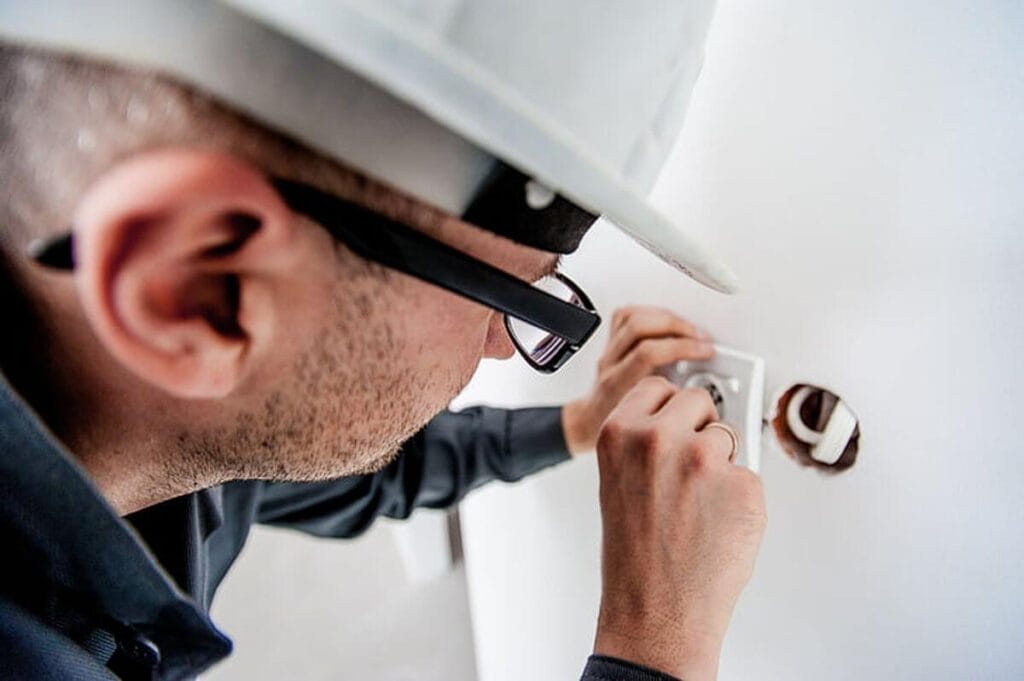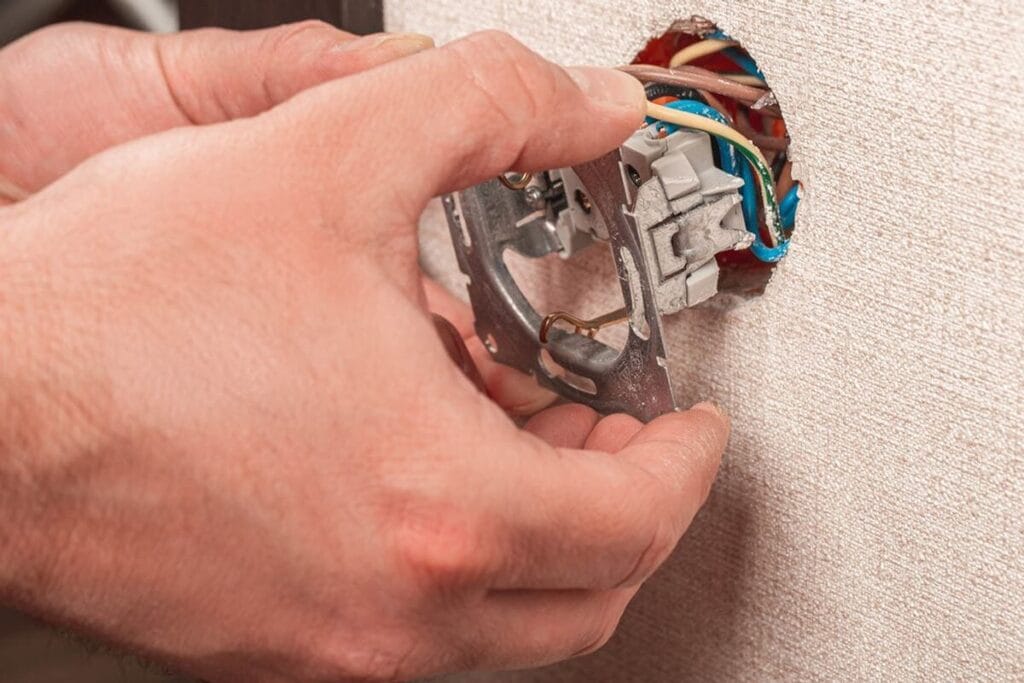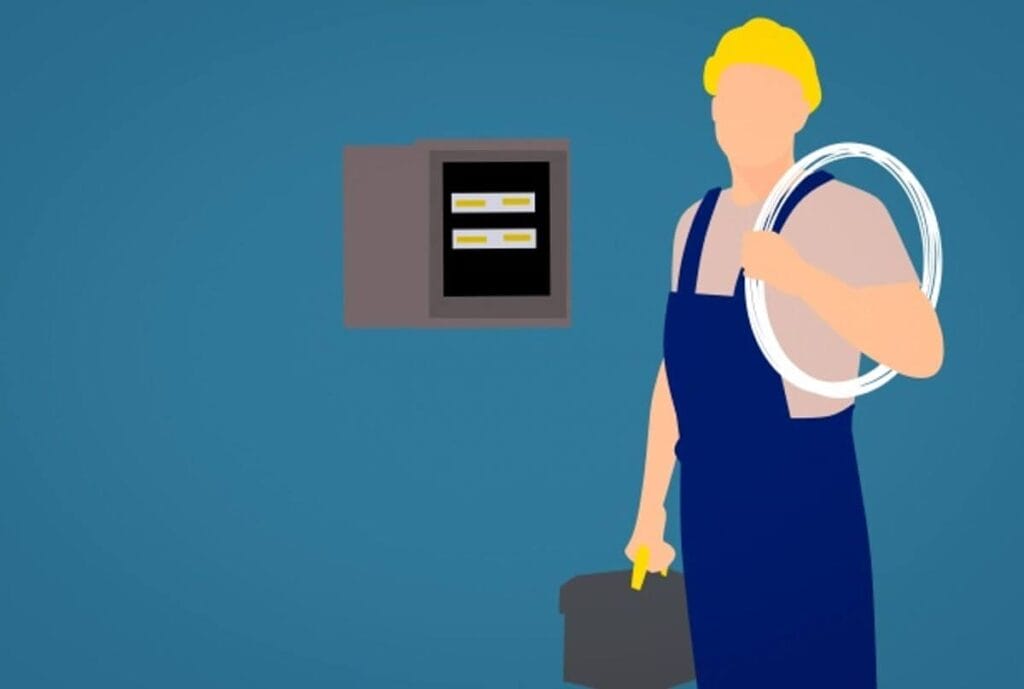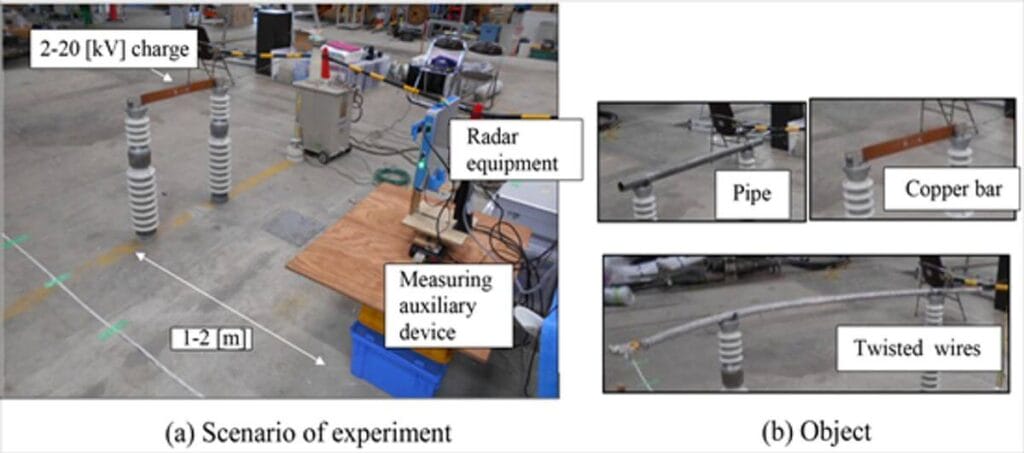5 Key Factors to Evaluate Before Hiring an Electrician

When it comes to electrical work in your home or business, hiring the right electrician is crucial for ensuring safety, efficiency, and reliability. The process of choosing an electrician should be thorough and informed to avoid potential hazards and ensure high-quality work. This article will discuss five key factors you should evaluate before hiring an electrician to help you make an informed decision.
Key Takeaways
- Verify the electrician’s licensing and insurance to ensure they are qualified and you are protected in case of accidents.
- Assess the electrician’s experience and expertise, particularly in the type of project you need, to guarantee they have the necessary skills.
- Examine the electrician’s reputation and track record through reviews and references to ensure they have a history of satisfactory service.
- Evaluate the electrician’s communication skills to ensure they can explain complex issues, listen to your concerns, and keep you updated.
- Look for an electrician who pays attention to detail, as precision is essential for the safety and longevity of electrical installations.
1. Licensing and Insurance
Before you hire an electrician, it is critical to confirm that they are licensed and insured. This is not just a formality; it’s a safeguard for both the homeowner and the electrician. A licensed electrician is authorized to perform electrical work and has demonstrated knowledge of the electrical system, wiring, and safety standards required by local authorities.
Licensing ensures that the electrician has the necessary expertise to handle complex tasks, such as installing a circuit breaker or upgrading residential electrical wiring. To obtain a license, electricians must undergo rigorous training and pass comprehensive exams that test their knowledge of electrical codes, safety protocols, and best practices in the field. This process helps to guarantee that licensed electricians have the skills and competence needed to perform electrical work safely and effectively.
Insurance provides a warranty of sorts, protecting you from liability in the event of accidental damage or injury during the electrical services. Accidents can happen even with the most experienced and cautious electricians, and without proper insurance coverage, you could be held responsible for any resulting damages or injuries. An insured electrician will have liability coverage that protects both you and their employees in case of unforeseen incidents.
Always request to see proof of licensing and insurance when considering a local electrician for your home’s electrical needs. This step is essential for peace of mind and the integrity of your home’s electrical wiring. A reputable electrician will readily provide documentation of their licensing and insurance, as they understand the importance of these qualifications in their profession.

When verifying an electrician’s license, be sure to check with your local licensing authority to ensure that the license is current and valid. You can also inquire about any past disciplinary actions or complaints against the electrician to get a better sense of their professional history.
Similarly, when reviewing an electrician’s insurance coverage, ask for details about the types and amounts of coverage they carry. A comprehensive insurance policy should include general liability, workers’ compensation, and property damage coverage. Don’t hesitate to ask for clarification if any aspect of their insurance is unclear.
By prioritizing licensing and insurance when choosing an electrician, you can have confidence that you are working with a qualified professional who is committed to safety and accountability. This due diligence on your part can help prevent potential issues down the line and ensure that your electrical project is completed to the highest standards.
2. Experience and Expertise
When searching for the best electrician, consider their level of experience and expertise. A master electrician, for instance, has reached the highest level of qualification in the field and can handle complex projects with ease. Here are a few points to keep in mind:
- Look for an electrician with a proven track record of successfully completing projects similar to yours. An experienced electrician will have encountered a wide range of electrical issues and will be better equipped to anticipate and address potential challenges in your project. They can also offer valuable insights and recommendations based on their past work.
- Verify their qualifications, including certifications and specializations that align with your specific needs. Some electricians may have additional training or expertise in areas such as renewable energy systems, home automation, or commercial electrical work. Choosing an electrician with relevant specializations can ensure that your project benefits from their focused knowledge and skills.
- Inquire about the electrician’s experience with electrical troubleshooting, as this can be crucial for identifying and solving issues quickly. A seasoned electrician will have developed a keen eye for diagnosing electrical problems and implementing effective solutions. This expertise can save you time and money by preventing minor issues from escalating into major repairs.
- Consider the electrician’s familiarity with local building codes and regulations. An experienced professional will stay up-to-date with any changes in electrical standards and will ensure that your project adheres to all necessary guidelines. This knowledge is particularly important for larger projects or renovations that may require permits and inspections.
- Ask about the electrician’s experience with energy efficiency and cost-saving measures. A knowledgeable electrician can recommend strategies for optimizing your electrical system’s performance, such as upgrading to energy-efficient lighting or installing smart home technology. These suggestions can help you reduce your long-term energy costs and minimize your environmental impact.
Choosing the right electrician near you involves evaluating their history of work and the knowledge they bring to the table. This ensures that you entrust your electrical needs to someone who is not only qualified but also experienced in delivering high-quality work. Don’t hesitate to ask for specific examples of past projects or inquire about their approach to problem-solving. A confident and competent electrician will be happy to share their expertise and demonstrate their value to your project.
3. Reputation and Track Record
A strong reputation and proven track record are essential indicators of a reliable electrician. Check online reviews and testimonials to gauge the experiences of past clients. Positive feedback often reflects a history of professionalism, punctuality, and fair pricing.
Start by searching for the electrician or their company on popular review platforms such as Google, Yelp, or the Better Business Bureau. Pay attention to the overall rating and the content of individual reviews. Look for patterns in the feedback, such as consistent praise for the electrician’s workmanship, communication skills, or timeliness. If you notice any recurring concerns or complaints, consider how the electrician or company has addressed them.

In addition to online reviews, ask for references from the electrician. A reputable professional will be happy to provide contact information for past clients who can vouch for their work. When reaching out to references, ask specific questions about their experience with the electrician, such as:
- Was the project completed on time and within budget?
- Did the electrician communicate clearly and regularly throughout the process?
- Were there any issues or surprises during the project, and how did the electrician handle them?
- Would you hire this electrician again for future electrical work?
Consistent positive remarks from previous customers can give you confidence in your hiring decision. If a reference seems hesitant or provides vague answers, it may be a sign to proceed with caution.
You can also ask for recommendations from friends, family, or colleagues who have recently completed electrical projects. Personal referrals can be valuable, as they come from people you trust who have firsthand experience with the electrician’s work.
Another way to gauge an electrician’s reputation is to inquire about their involvement in professional organizations or community initiatives. Electricians who are active in industry associations or who participate in local charity projects demonstrate a commitment to their craft and their community. This engagement can be a positive indicator of their professionalism and reliability.
Remember, a reputable electrician will not only meet your expectations but strive to exceed them, ensuring that your electrical needs are met with the highest standards. By thoroughly researching an electrician’s reputation and track record, you can make an informed decision and select a professional who will deliver the quality work you deserve.
4. Communication Skills
Effective communication is a cornerstone of any successful electrical project. An electrician’s ability to articulate complex issues, like explaining a breaker malfunction to someone without a technical background, is essential. They must be clear and concise, ensuring that clients are fully informed and comfortable with the work being done.

Key aspects of communication to consider include:
- The electrician’s willingness to listen to your concerns and address them. A good electrician will take the time to understand your needs, preferences, and any apprehensions you may have about the project. They should be patient and attentive, making sure that you feel heard and valued as a client.
- Their capability to provide clear explanations and regular updates. An electrician who can break down technical concepts into layman’s terms demonstrates a strong grasp of their trade and a commitment to client education. They should be able to walk you through the scope of the project, the expected timeline, and any potential challenges or considerations.
- Responsiveness to questions or clarifications throughout the project. A communicative electrician will make themselves available to address your concerns and provide updates as the work progresses. They should be prompt in returning your calls or emails and should be willing to take the time to discuss any aspects of the project that you may be unsure about.
- The electrician’s ability to provide a detailed, written estimate of the work to be done. A clear, itemized estimate demonstrates transparency and professionalism. It should outline the specific tasks to be completed, the materials required, and the associated costs. This document serves as a roadmap for the project and helps to avoid any misunderstandings or surprises down the line.
- Their openness to feedback and collaboration. A skilled electrician will value your input and be willing to incorporate your suggestions or preferences into the project where feasible. They should be open to discussing alternative approaches or solutions and should work with you to find the best outcome for your specific needs.
Remember, a project runs smoothly when both parties maintain open lines of communication. This minimizes misunderstandings and builds a foundation of trust, which is crucial for a successful partnership. When evaluating an electrician’s communication skills, pay attention to how they interact with you during the initial consultation and throughout the bidding process. Are they responsive, clear, and patient in their explanations? Do they take the time to address your questions and concerns thoroughly? These early interactions can give you a good sense of what to expect in terms of communication throughout the project.
5. Attention to Detail
When hiring an electrician, attention to detail is paramount. Electrical work is intricate and demands precision to ensure safety and functionality. An electrician who is meticulous can prevent future issues and guarantee that all components meet the necessary standards.

Consider these points to assess an electrician’s attention to detail:
- They should conduct a comprehensive review of your electrical system before starting work. A detail-oriented electrician will take the time to thoroughly inspect your existing wiring, panels, and outlets to identify any potential issues or areas for improvement. They should also ask questions about your electrical needs and preferences to ensure that the project is tailored to your specific requirements.
- Look for a history of projects completed without electrical faults or failures. An electrician who consistently delivers high-quality work will have a track record of successful installations and repairs. Ask for examples of past projects and inquire about the steps they took to ensure that the work was completed to the highest standards.
- Notice if they are proactive in addressing potential problems before they escalate. A meticulous electrician will not only focus on the immediate task at hand but will also consider the long-term implications of their work. They should be able to identify potential issues, such as outdated wiring or overloaded circuits, and recommend proactive solutions to prevent future problems.
- They should have a keen eye for aesthetics and organization. While the primary focus of electrical work is functionality and safety, a detail-oriented electrician will also consider the visual impact of their work. They should take care to install wiring and components in a neat and organized manner, minimizing any unsightly clutter or exposed wires.
- They should be well-versed in the latest electrical codes and standards. A meticulous electrician will stay up-to-date with any changes in local, state, and national electrical regulations to ensure that their work is compliant and safe. They should be able to explain these standards to you and demonstrate how their work adheres to them.
A detail-oriented electrician will not only perform tasks with care but will also ensure that the work adheres to all safety codes and regulations. This commitment to excellence can save you time and money in the long run by avoiding costly repairs or hazardous situations.
When interviewing potential electricians, ask about their process for ensuring quality control and attention to detail. A professional who is proud of their work will be happy to explain their methods and provide examples of how they maintain high standards on every project.
Red Flags to Watch Out For
While it’s essential to focus on the positive attributes of a qualified electrician, it’s equally important to be aware of potential red flags that may indicate an unprofessional or untrustworthy contractor. Keep an eye out for the following warning signs:
- Lack of proper licensing or insurance. If an electrician is unable or unwilling to provide proof of their licensing and insurance, it’s a clear sign that they may not be qualified or reliable. Never work with an electrician who cannot demonstrate their credentials.
- Poor communication or responsiveness. If an electrician is difficult to reach, slow to respond to your inquiries, or fails to provide clear answers to your questions, it may be a sign of poor communication skills or a lack of professionalism. You want to work with someone who is responsive and transparent throughout the process.
- Pressure tactics or aggressive sales pitches. Be wary of electricians who try to pressure you into making a decision quickly or who use scare tactics to convince you to agree to unnecessary work. A reputable electrician will provide honest, straightforward advice and will give you the time and space to make an informed decision.
- Unusually low bids or vague pricing. If an electrician’s bid is significantly lower than others or if they are reluctant to provide a detailed, written estimate, it may be a sign that they are cutting corners or using subpar materials. Always get multiple bids and be cautious of deals that seem too good to be true.
- Inconsistent or incomplete references. If an electrician is unable to provide references or if the references they provide are vague or unresponsive, it may indicate a lack of satisfied customers or a history of subpar work. Follow up with references and trust your instincts if something doesn’t feel right.
- Unwillingness to pull necessary permits. A reputable electrician will ensure that all required permits are obtained before starting work. If an electrician suggests that permits are unnecessary or tries to convince you to bypass the permitting process, it’s a red flag that they may not be following proper safety and regulatory guidelines.
By being aware of these potential warning signs, you can avoid hiring an electrician who may not have your best interests in mind. Trust your instincts and don’t be afraid to ask questions or seek clarification if something doesn’t feel right. It’s better to take the time to find the right professional than to rush into a decision that could lead to subpar work or safety hazards down the line.
Conclusion
In summary, hiring the right electrician is a critical decision that can impact the safety and success of your electrical project. It’s essential to evaluate key factors such as the electrician’s qualifications, experience, reputation, communication skills, and attention to detail. Additionally, be cautious of red flags like unsatisfactory references, lack of transparency in pricing, and inadequate insurance coverage.
By thoroughly vetting potential candidates and ensuring they meet the necessary standards, you can trust that your electrical needs will be handled professionally and safely. Remember to ask for recommendations, read reviews, and verify credentials and insurance to make an informed decision.
When you find an electrician who ticks all the boxes, you can proceed with confidence, knowing that your project is in capable hands. A skilled, reliable electrician will not only complete the work to your satisfaction but will also provide valuable guidance and support throughout the process.
Investing the time and effort to choose the right electrician can pay off in numerous ways. You’ll have peace of mind knowing that your electrical system is safe and up to code, and you’ll be able to enjoy the benefits of a job well done for years to come. Plus, establishing a relationship with a trusted electrician can be invaluable for future projects or maintenance needs.
Ultimately, the effort you put into choosing the right electrical contractor will contribute to the smooth execution and long-term reliability of your electrical installations. By following the guidelines outlined in this article and trusting your instincts, you can find an electrician who will exceed your expectations and deliver the high-quality work you deserve.
Q: What are the essential factors to consider when hiring an electrician for your home electrical needs?
A: When hiring an electrician, consider their qualifications, experience, licensing, insurance, warranty offerings, and reputation in the industry. It’s essential to ensure they are knowledgeable, skilled, and trustworthy to work on your home’s electrical system.
Q: How do I find the best electrician for my needs?
A: To find the best electrician, start by researching local electricians, checking online reviews, asking for recommendations from friends or family, and verifying their credentials and licenses. Compare their services, pricing, and reputation before making a decision.
Q: What should I look for in an electrician before hiring them?
A: Before hiring an electrician, make sure they are licensed, insured, and experienced in the type of electrical work you need. Ask about their qualifications, certifications, warranty options, and past projects to gauge their expertise and professionalism.
Q: Why is it important to hire a licensed and insured electrician?
A: Hiring a licensed and insured electrician ensures that they have met the required standards and regulations for electrical work in your area. It also provides you with protection in case of any accidents, damages, or liabilities during the job.
Q: What questions should I ask an electrician before hiring them?
A: Before hiring an electrician, ask about their experience, qualifications, pricing structure, timeline for the project, warranty options, and references from previous clients. Additionally, inquire about their liability insurance and workers’ compensation coverage for added peace of mind.
Q: How can I ensure I choose the best electrician for my home electrical needs?
A: To choose the best electrician, conduct thorough research, read reviews, ask for recommendations, verify credentials, interview potential candidates, and compare their services and pricing. It’s important to hire a professional and reputable electrician for quality work.
Q: What are some tips for hiring a residential electrician?
A: When hiring a residential electrician, consider factors such as their experience with residential projects, familiarity with local building codes, ability to communicate effectively, and willingness to provide detailed estimates and timelines for the job.
